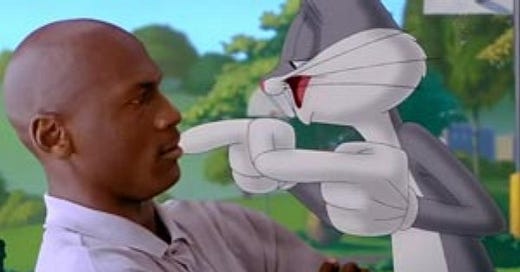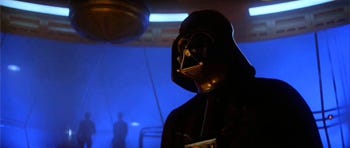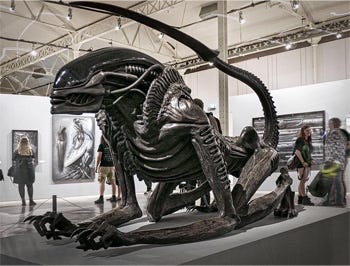6 Outrageous Ways Hollywood Can (And Will) Screw You Over
Breaking into Hollywood is really hard. Especially when the very industry you're trying to break into is aching to screw you over.

Breaking into Hollywood is really hard. It's difficult enough trying to make ends meet flipping burgers while you desperately hope for a break in your real career, but it turns out there's an added complication on top of that: The very industry you're trying to break into is aching to screw you over. Here are a few examples ...
6. The Guy Who Played Darth Vader Never Earned A Cent In Star Wars Royalties
The role of Darth Vader in Star Wars may have made James Earl Jones a legend, but the guy who actually wore the suit, David Prowse, had no such luck. If you don't know the story, the short version is that Prowse performed as Vader, acting and speaking in all the scenes, as actors do, only to have his voice later overdubbed by Jones without his knowledge. One of the most iconic roles in movie history was half-yanked out from under his nose. He never starred in another movie again after the Original Trilogy. But at least he went on to live the high life on Star Wars' smash hit profits, right?
Nope! After his last paltry paycheck for Return Of The Jedi, Prowse never saw a single cent from the films, despite the fact that he signed a contract specifying that he would earn an ongoing percentage of their net profits. The problem is that the films officially never made any profit. That's right: Star Wars, the biggest movie franchise of all time, never made back its investment.
In fact, almost no movie ever has. A whopping 80 percent of all Hollywood films record that they lost money and made zero profit. Holy shit, how does the industry even exist? To find out, we need to dive into the batshit world of Hollywood accounting. Here's how it works: If you read the credits at the end of any high-budget movie, you'll usually see a credit to something like "Batman v. Superman LLC Inc." That's because every movie is set up as its own company, independent but answerable to the studio that produces it. The studio then proceeds to charge the shell company several times what it truly costs to make the movie, so even if the film makes crazy profits at the box office, the shell company will never be able to pay the studio back. That's okay, because the shell company and the studio are the same people. On the books, however, the movie records a loss, which means they don't have to pay anyone stupid enough to accept "net" points in their contract. Always get the gross points, kids.
How is all this legal, you ask? Hahaha, you sweet innocent fool with ribbons in your hair. It's not! But like any giant industry, how much that matters depends on how good your lawyer is. One lawyer, Neville Johnson, has spent his career fighting the studios over this bullshit, and in most cases, the studios wind up settling out of court. Which, in case you've still retained some of those hair ribbons, is legal speak for "We're guilty, but we'll give you some money to pretend we're not."
5. The Conjuring Offered A "Contest" For Sequel Ideas Where The Prize Was $50 And No Credit
Horror film series The Conjuring has had an absurd number of spinoffs centered on seemingly every side character or object that's appeared in the main franchise. They made two movies about that spooky Annabelle doll that showed up in a prologue in the first movie. They made a movie about the demonic nun who turns up occasionally in the sequel. They're making one that's about the Crooked Man ghost that climbs out of a children's toy. It's gotten to the point where Warner Bros. is now calling on Conjuring fans (known as "Conjurers" or "Warreners") pick the next piece of Conjuring scenery that gets its own movie. In fact, a contest called "My Annabelle Creation" recently wrapped up. It invited budding filmmakers to make a short film based on the Conjuring franchise.
Red Letter Media co-creator Mike Stoklasa discovered the contest and figured it might be a fun project for RLM to submit their own entry, as a gag if nothing else. That's when Stoklasa did what few people ever bother to do and read the legal fine print on the contest's website. Buried under almost 8,000 words of legal gobbledygook, it states:
Each entrant agrees that, in addition to the license granted above, sponsor (or any of sponsor's parents, affiliates, or subsidiaries) may, upon written notice to entrant at any time within approximately three (3) months of the verification of the winner in this contest, acquire from entrant an exclusive and irrevocable option to purchase all right, title and interest in and to his or her entrant content ("option") in exchange for fifty U.S. dollars.
In regular language, that means that if you win the contest, Warner Bros. immediately owns your idea and gets to strip you of all credit in return for a crisp $50 bill. The contract goes on to state that if they eventually decide to adapt your film into a full-length movie, they will slam down another $50 bill. And then never speak to you again.
You don't need a spreadsheet to tell you that's hot bullshit, at best a tiny fraction of what you might have spent making the video in the first place. But there is one other part of the prize we didn't mention: getting flown out to LA to meet with David Sandberg, the Annabelle: Creation director, personally. So that's still something. Except the contract also stipulates that if he can't fit you into his schedule that day, he won't meet you, and "no substitute or replacement will be provided." Oh. So that's now literally nothing.
They still get the trip at least, although even then, the worst insult might be seeing how far $100 gets you in LA.
4. Gravity And Life Were Based On The Same Novel -- Whose Author Received Zero Credit
Tess Gerritsen's 1999 novel Gravity is about a female astronaut who, after the death of the rest of her crew and the destruction of her spacecraft, is forced to float around in space in nothing but her spacesuit. If you think that sounds familiar, you're right. It's the exact plot of a 2013 film directed by Alfonso Cuaron called Gravity. A movie which was not, apparently, based on the novel.
Let's back up a bit. Shortly after her novel was published, Gerritsen optioned the film rights to New Line, whose adaptation made it all the way into pre-production. Ultimately, this project fell through, and Gerritsen didn't hear anything more about it. Life's like that, chin up kid, etc ...
But fast-forward a decade, and Gerritsen caught wind of a very familiar-sounding film in production. The film was called Gravity, and it was being made by Warner Bros., which had bought New Line in the intervening decade. Now, initially, she chalked this up as a coincidence. Sure, it was the same studio and encompassed many of the same plot points, and sure, it had the exact same title, but it's not all that unlikely that someone else would come up with a story about an astronaut lost in space and that they would title that story Gravity. Also, the first half of her book deals with the astronauts getting killed off one by one by an alien life form, a plot point notably missing from the floating Sandra Bullock movie.
But later on, Gerritsen found out the director who had been initially attached to direct her adaptation was, you guessed it, Alfonso Cuaron, who now evidently wrote this new movie himself. Gerritsen lawyered up faster than Garfield eats a lasagna, but the judges shot her case down twice, essentially on the premise that Warner Bros. wasn't obliged to honor any of New Lines' old contracts. Gerritsen learned a hard lesson about the movie business and skulduggery in general. Which should have been the end of the story.
But it wasn't. In 2017, the film Life was released, about a team of astronauts who get killed off one by one by an alien life form that features the exact same characters (with different names) that appeared in the Gravity novel. It looks an awful lot like they took the parts they discarded the first time around and made a whole second movie out of it. Gerritsen claims she's not going to bother fighting this one, and we can hardly blame her. There are only so many trips into Hollywood's legal snake pit a person can be expected to take.
3. H.R. Giger Was Repeatedly Screwed Out Of The Alien Sequels
If you've ever heard of the Swiss surrealist H.R. Giger, it's most likely for his role in designing the title character from Alien. Ridley Scott wanted to find someone who could design the scariest movie alien of all time, and Giger, the famous horrific artist, fit the bill. Really fit the bill; his work wound up winning him the 1979 Oscar for Visual Effects.
And that's where his contribution to the long-running Alien franchise ended. You probably assumed that he was involved in at least a few of the thousand sequels, prequels, and Vs. Predators that came afterward, but the truth is that despite Giger's ongoing passion for the franchise, Hollywood wanted nothing to do with him. When James Cameron's Aliens went into production, Giger assumed he'd be summoned to design more walking-penis-with-teeth-with-another-penis-with-teeth-for-a-tongue creatures, and even turned up with a bunch of new designs. But Cameron snubbed him completely, preferring to employ his close friend Stan Winston to design the aliens and effects, a decision which left Giger "perplexed and generally hurt."
Then Alien 3 came around, and David Fincher decided to approach Giger for ideas. Giger was so excited to be involved again that he cranked up production on new xenomorph designs, and even told the studio that he wouldn't charge them for his time. After drawing up a bunch of designs for the new alien, including a full working model ...
... Giger found himself snubbed again. 20th Century Fox again commissioned Stan Winston Studios to design the creatures, and although they were pretty much the exact same monsters that appeared in the original, they refused to give Giger any payment or credit for the initial design.
If you had any preconceived notion about Giger before now -- keeping in mind he made Lovecraftian, psychosexual, biomechanical penis-monsters -- then you'd probably be surprised to learn that he was the sweetest guy in the world. He responded to every Hollywood snub with a nod and a slightly hurt smile, and when asked about the ongoing reaming he was getting from the multi-billion-dollar franchise he helped create, he replied simply, "All I ever wanted to do was make a good Alien."
You did, H.R. It's just a shame you only ever got to make the one.
2. Hollywood Stole A Guy's Screenplay And Made It Into A Matt Damon Movie
In 1995, budding screenwriter Jeff Grosso submitted an unsolicited script titled Shell Game to Miramax. Grosso was a poker enthusiast who paid his way through film school by playing Texas Hold 'Em semi-professionally, so it was natural that his first script would be about poker. In 1998, the movie based on his script, Rounders, was released, boasting an all-star cast featuring Matt Damon, Edward Norton, Famke Janssen, and John Malkovich. The problem? Grosso had never heard of it before it hit theaters. He discovered that his movie had been made at the same time everyone else did, and his name doesn't appear in the credits.
Grosso went ahead and sued the studio for stealing his story, but in 2006 a judge threw his case out. The reasoning was that Grosso had neglected to sign a proper contract with the studio agreeing that they wouldn't steal his idea. You see, a popular loophole in Hollywood is the fact that "ideas" aren't subject to federal copyright protection. Expression of ideas is protected, but the law has a lot of trouble interpreting what that means. So if you're a powerful enough film studio, you can totally steal someone's script and change just enough of the minor details that it magically now belongs to you.
This is far from the only time it's happened. The films The Last Samurai, Knocked Up, Pirates Of The Caribbean, Broken Flowers, Year Of The Dog, and Amistad have all been sued by amateur screenwriters for this kind of "idea theft." We don't know how many of these are genuine cases of theft as opposed to simple coincidence, but in any case, it's clear that you shouldn't pitch a movie to Hollywood if you're not flanked by a conga line of agents, lawyers, and maybe a witch or two.
1. The Voice Cast Of Space Jam Was Not Invited To The Premiere
You might not be immediately familiar with the name Billy West, but you've definitely heard his voice. He's Fry, Farnsworth, and Zoidberg. He's Stimpy. He's Doug. He's the goddamn Red M&M. He's the most ubiquitous and hard-working cartoon voice actor in pop culture. And when Hollywood premieres a big-budget production that he performs in, you'll find him ... in the guest section. If he was even invited.
See, as far as Hollywood is concerned, a voice actor might as well be the guy who buys the Starbucks for the intern's assistant. Even West, who has been called "the new Mel Blanc" for his incredible range, gets the same treatment. They'll begrudgingly list him in the credits, but he won't get an invitation to the after-party. West has been quite open about how voice actors are "the redheaded bastard stepchildren of the industry," noting how they're regularly overlooked in high-budget cartoon productions in favor of A-list actors who can't voice-act their way out of a bag. But the A-list actors put butts in the seats and look better on the red carpet, and that, as they say, is that.
One anecdote illustrates this point perfectly. One of the highlights of West's career was when he voiced Bugs Bunny in Space Jam. And he nailed it -- who could even tell that wasn't Mel Blanc back from the grave? So when the premiere rolled around, he and his friend Bob Bergen (who voiced Porky Pig) knew they probably wouldn't be walking the red carpet, but they at least expected an invitation. But when their agents inquired about it, they were told, "The premiere is only for the talent."
Given enough pressure from West's agent, the organizers eventually sent him a ticket. But when West rocked up to Grauman's Chinese Theatre on opening night, the bouncers told him that his seat was in the "overflow theater" next door -- basically where all the extras, makeup artists, janitorial staff, and everyone else evidently more important than the guy who voiced the main character got to sit. It is our responsibility to assume that West then dressed up as a female rabbit and seduced his way past the bodyguards to his rightful seat next to Michael Jordan.















